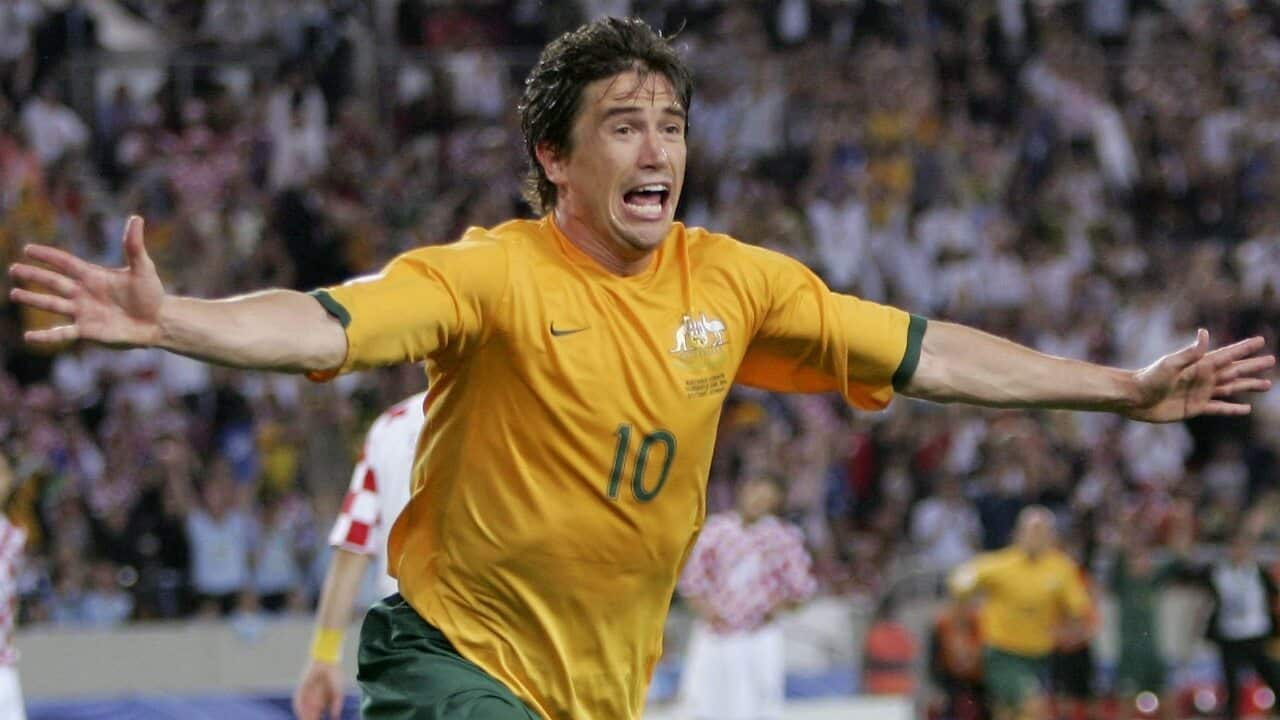WATCH the next of our FIFA World Cup classic matches - Croatia v Australia 2006 - this Sunday 21 June at 3:00pm (AEST) on SBS and streamed via The World Game website / app and SBS On Demand.
1. Australian football history - a game and country united
Right now everyone is calling for unity in Australian football. For everyone to come together and support one cause. It’s a rare thing in society, never mind football, but on that night, or early morning, in 2006 it was there.
Not only the football community but the entire country was behind the Socceroos in what was the most important match in our history to date.
The 2015 Asian Cup was an incredible achievement, the night we qualified against Uruguay will never be forgotten, but this was the best night in Australian football history.
To show not only that we belonged at the World Cup but that we had the ability to compete with anyone was a historic moment for the sport and the country and will long be remembered.
2. Kewell’s greatest moment
Along with Mark Viduka and Tim Cahill, Harry Kewell is the most talented and successful player we have ever produced.
A truly world class talent that at his peak could play for any team in the world. Barcelona and Manchester United wanted him, Liverpool got him.
But Kewell had come under fire for two things in his career. His injuries and his commitment to Australia.
Prior to our move into the Asian Football Confederation, it was rare for our biggest names to make the trip all the way out to Australia to play in an Oceania qualifier.
But this match put those qualms to bed.
“It was poetic,” Les Murray explains in the documentary Two Weeks in June.
“Harry was sent out under the medical conviction that he would last 60 minutes. On 60 minutes, (Guus) Hiddink was waving at Harry to come off, and Harry refused.
“He was in pain at that point, because he had septicemia in his foot.
“He played through the pain barrier, a very courageous act. One of the most heroic acts of any footballer I’ve ever seen. And of course scored that vital goal.
Mark Bresciano, the man who had scored the crucial goal against Uruguay, swung in the cross.
John Aloisi, the man who had converted the crucial penalty against Uruguay, flicked on the header.
Harry Kewell, who was the biggest star our game had ever produced at that point, waited at the back post.
“Harry Kewell has done it! Australia’s golden boy has come up with a golden goal!” Simon Hill screamed on commentary.
“It just had to be Harry.”
As Craig Foster explained in that same documentary, it was the perfect line for the perfect moment.
“He was up and down, and he was criticised and he was loved. But in the end, when he was needed he was always there.
“If you want to put someone at the back post in that moment to get us through to a round of 16 at a World Cup you tell me someone better that you would have put there. I wouldn’t put anyone else, I’d put Harry.”
3. Lucas Neill
While the 2006 World Cup seems to be remembered by single moments, one thing that doesn’t get talked about as much as it should is Lucas Neill’s performance throughout the tournament.
Neill will unfortunately forever be associated with our exit after giving away the penalty against Italy in the dying seconds.
But Neill was one our best performers at that tournament and this match shows why.
Immense in defence, vital in the build-up play. This was a performance that had the world watching and he was highly sought-after in the weeks after the tournament.
4. Referee incompetence
Referees are never popular, but Graham Poll and his assistants had one of the all-time worst performances.
We should have had a penalty when Viduka was rugby tackled by Simunic in the first half. Kewell’s equaliser actually should have been ruled offside. Australia should have had a second penalty when Tomas punched the ball out of play in the 75th minute. There were three red cards, there should have been more. Simunic received a historic, an illegal, three yellow cards.
Now the game is over and Australia got the result we wanted we can laugh at this absolute disaster-class from the referees.
5. A young Luka Modric
In the 74th minute of this match a 20-year-old Luka Modric is subbed on for Croatia.
While he doesn’t dominate this match like he does many others later in his career, there are still early signs of his intelligence, his positioning, his touch, that outside of the foot pass.
Thank god he didn’t score or assist that night, but it's always special to watch a world class talent in their early days.
6. The Australian-Croatian ties
It is very rare that a World Cup match has so many players who know each other from their junior days.
We had Zeljko Kalac, Jason Culina, Mark Viduka, Tony Popovic, Josip Skoko and Ante Covic with Croatian ties.
Croatia had Josip Simunic - born and raised in Canberra, Joey Didulica - born and raised in Geelong, and Anthony Seric born and raised in Sydney.
This game was a very personal affair played out in front of a global audience.


